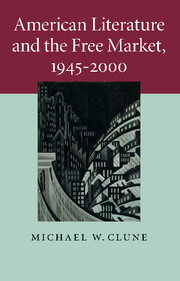Book contents
- Frontmatter
- Contents
- Acknowledgements
- List of abbreviations
- Introduction: The economic fiction
- 1 Freedom from you
- 2 Frank O'Hara and free choice
- 3 William Burroughs' virtual mind
- 4 Blood money: sovereignty and exchange in Kathy Acker
- 5 “You can't see me”: rap, money, and the first person
- Conclusion: The invisible world
- Notes
- Bibliography
- Index
Introduction: The economic fiction
Published online by Cambridge University Press: 23 February 2010
- Frontmatter
- Contents
- Acknowledgements
- List of abbreviations
- Introduction: The economic fiction
- 1 Freedom from you
- 2 Frank O'Hara and free choice
- 3 William Burroughs' virtual mind
- 4 Blood money: sovereignty and exchange in Kathy Acker
- 5 “You can't see me”: rap, money, and the first person
- Conclusion: The invisible world
- Notes
- Bibliography
- Index
Summary
Frederic Jameson, midway through his study of postwar literature and culture, raises what remains one of the field's most troubling questions. After patiently examining the fall of state socialism, tracing the rise of neoconservative free market ideology, and offering a Marxist analysis of these developments, he suddenly throws up his hands. “None of these things, however,” he writes, “go very far towards explaining the most astonishing feature” of the period. What remains unexplained is “how the dreariness of business and private property, the dustiness of entrepreneurship … should in our time have proved to be so sexy.” Here Jameson confronts the fact that the prospect of a global free market has become an object of nearly universal fascination since the end of the Second World War. By the eighties and nineties, this fascination with the market was ubiquitous, expressed in phenomena as diverse as daytime talk shows, the Contract with America, news features on the New China, movies about the stock market, science-fiction novels, and music videos. Americans were captivated by the impulse to replace relations to governments, to traditions, to cultures, and to communities with a relation to market price. The specter of a purely economic world casts a shadow over the history of this period.
- Type
- Chapter
- Information
- American Literature and the Free Market, 1945–2000 , pp. 1 - 26Publisher: Cambridge University PressPrint publication year: 2009



